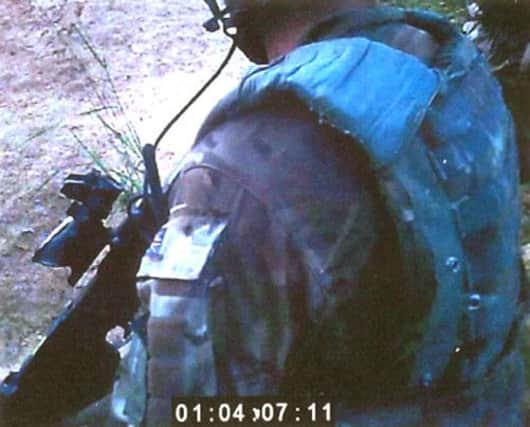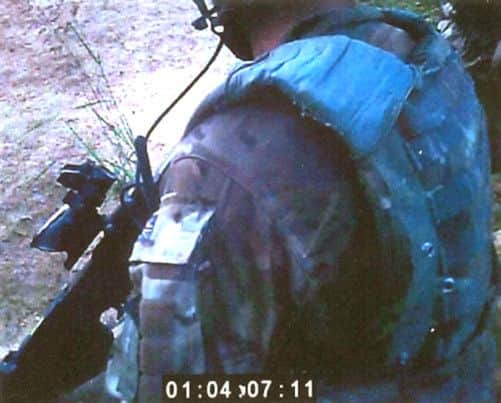Royal Marine murdered wounded Afghan insurgent


Brigadier Bill Dunham spoke out after the commando was convicted of murdering the seriously wounded prisoner in Helmand Province two years ago.
A court martial heard and saw shocking evidence from a helmet-mounted camera belonging to one of the marines which captured the entire incident. The video footage was discovered only a year after the event by military police investigating an unrelated matter.
Advertisement
Hide AdAdvertisement
Hide AdThe guilty serviceman, known only as Marine A, shot his victim at close range in the centre of his chest and faces a mandatory life prison term.


The court-martial board found him guilty of murder after a two-week trial at the military court centre in Bulford, Wiltshire. Two of his comrades, known only as Marines B and C, were acquitted of the same charge by the seven-strong board of officers.
Initially, the marines told senior officers the man had been killed in a helicopter attack.
This was the first time British forces have faced a murder charge in relation to the conflict in Afghanistan, and Brigadier Dunham, Deputy Commandant General Royal Marines, said: “It is a matter of profound regret in this isolated incident that one marine failed to apply his training and discharge his responsibilities.
“What we have heard over the last two weeks is not consistent with the ethos, values and standards of the Royal Marines. It was a truly shocking and appalling aberration. It should not have happened and it should never happen again.
“It is now for the Royal Marines to consider any impact from this case on the training given to our people as we seek to uphold the very highest standards that we constantly strive to instill and perpetuate.”
Footage captured by Marine B’s camera shows the moment the insurgent is killed. After Marine A fires a shot, the man convulses on the ground.
The marine, described as an experienced sergeant, says: “There you are, shuffle off this mortal coil, you c***. It’s nothing you wouldn’t do to us.”
Advertisement
Hide AdAdvertisement
Hide AdHe then turns to comrades and says: “Obviously this doesn’t go anywhere, fellas. I just broke the Geneva Convention.”
During the trial, the court heard the marines had been on patrol in a “kinetic” area of Afghanistan on 15 September, 2011, when they discovered the insurgent seriously injured in a field following an attack by an Apache helicopter.
Superiors were told the man had died from wounds sustained in the gunship attack, in which 139 30mm anti-tank rounds were fired. But a year later, the footage of the murder was discovered on a laptop by military police investigating unrelated matters.
Marines A, B and C – along with other members of the patrol – had been instructed to carry out a “battle damage assessment” of the area and found the man lying in a field.
Footage shows the Afghan national on the ground, wearing a white dish-dash covered in blood, with his eyes wide open and rolled back. Members of the patrol can be heard calling him a “f****** prick” and “f****** c***” .
Marine A reported to his superiors that the insurgent was still alive and that he was manhandled to the side of the field, under the cover of trees.
Footage shows the injured man suffering kicks from the servicemen before being flipped over from his back to his front.
As Marine B gives the pretence to a watching helicopter of administering first aid, he is heard to say: “For f***’s sake, I cannot believe I’m doing this.”
Advertisement
Hide AdAdvertisement
Hide AdMarine C replies: “Don’t – just don’t – yeah, wait a minute, just pretend to do it until he’s behind them trees.”
Two minutes later, Marine A shoots the insurgent.
The body has never been found and it is understood only villagers near where he was killed know his identity.
After returning to his command post, Marine A told members of the patrol “I f***** up, lads”, and nothing was said to correct the view formed by senior officers that the insurgent had died from his wounds.
But in September last year, the video clip showing the Afghan national being roughly manhandled across the field was found and an investigation began.
Marines A, B and C were arrested on suspicion of alleged war crimes but insisted the insurgent had died from wounds sustained in the Apache attack. Investigators later recovered a further clip, showing Marine A shooting the man in the chest. Marine A then admitted he fired his gun out of anger but insisted the insurgent was already dead.
David Perry, QC, prosecuting, said: “It was not a killing in the heat and exercise of any armed conflict. The prosecution case is that it amounted to an execution, a field execution. An execution of a man who was entitled to be treated with dignity and respect and entitled to be treated as any British serviceman or servicewoman would be entitled to be treated in a similar situation.”
Marine A told the trial why he fired. “Stupid, lack of self-control, momentary lapse in my judgment,” he said. “I thought about it over the last year as we get towards these proceedings but I cannot give any other reason than to say that it was poor judgment and lack of self-control. I thought he was dead.”
He blamed “foolish bravado” for quoting Shakespeare at the dying man and said it was something “I am not proud of”.
Advertisement
Hide AdAdvertisement
Hide AdFamily members of all three marines on trial gasped and some began to cry as the judge convicted Marine A of murder. The courtroom was cleared so he could speak to his close family before being taken into custody.
The issue of revealing the names of Marines A, B and C – as well as Marines D and E who were also on the patrol – will be determined at a later appeal hearing after Judge Advocate General Jeff Blackett ruled they should be identified.
The judge remanded Marine A in custody until sentencing on 6 December. He told him: “The mandatory sentence prescribed by law is imprisonment for life. This court now has to determine the minimum term you will serve before you are eligible for release.”
The Service Prosecuting Authority, which brought the case, said: “With the conviction of Marine A, the court martial board has sent an unambiguous message that there can be no excuse or justification for the unlawful actions described during this trial and that the consequence of such actions will be of the utmost seriousness.”
The Geneva Convention is an international agreement concerning the treatment of captured and wounded prisoners of war and was first signed in Geneva in 1864. It was revised in 1949.
READ MORE